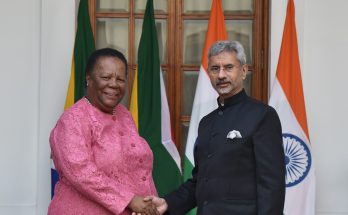
By Gurjit Singh
On February 26, Tokyo hosted the Japan-India-Africa Business Forum, a landmark event jointly organized by Japan’s Ministry of Economy, Trade and Industry (METI) and Nikkei. The forum brought together government officials, business leaders, and industry stakeholders from Japan, India, and Africa to explore opportunities for trilateral cooperation in sustainable economic development. Japan’s Minister of Economy, Trade and Industry, Muto Yoji, participated in person, while India’s External Affairs Minister, Dr. S. Jaishankar, joined virtually, emphasizing the high-level commitment to this initiative. At the centre of the forum was the launch of the Japan-India Cooperation Initiative for Sustainable Economic Development in Africa, a bold new vision aimed at deepening trilateral economic engagement. The initiative is structured around two strategic pillars: (1) establishing India as an industrial hub for Africa-focused trade and investment, and (2) boosting private sector activity, job creation, and skills development in African nations.
Pillar One: India as an Industrial Hub for Africa
The first pillar seeks to transform India into a strategic industrial base for Japanese businesses targeting the African market. By encouraging Japanese firms to establish and expand operations in India, the initiative aims to promote joint ventures and projects linked to African trade and investment. These efforts are supported through a series of policy measures, including:
- Enhanced policy coordination with Indian state governments to reduce trade and investment barriers.
- Infrastructure development to support long-term industrial capacity.
- Creating incentives for Japanese companies to use Indian facilities for Africa-bound production.
This pillar revives the vision behind the Asia-Africa Growth Corridor (AAGC but not the AAGC itself which was think tank, not business concept. Unlike the BRI’s debt-financing model, India and Japan need to focus on quality infrastructure, human resource development, and connectivity. The new initiative builds on these principles while aligning with India’s “Act East” policy and Japan’s “Expanded Partnership for Quality Infrastructure.”
Pillar Two: Driving Investment and Skill Development in Africa
The second pillar aims to stimulate sustainable development in Africa by encouraging direct investment, creating jobs, and fostering human capital. This involves:
Supporting Japanese investment in African markets, especially in key growth sectors.
- Promoting collaboration between Japanese and Indian firms to co-develop solutions tailored to African needs.
- Launching joint R&D projects and innovation hubs focused on Africa’s development.
- Establishing talent exchange programs between Japan, India, and Africa to train a skilled workforce and support technology transfer.
This multifaceted strategy is backed by coordinated efforts from Japanese institutions such as JBIC, NEXI, and JICA. Financing mechanisms are being aligned with Official Development Assistance (ODA) frameworks, while new platforms for regular engagement—like the Japan-India-Africa Business Forum—are expected to institutionalize trilateral dialogue. Additionally, global events such as Expo 2025 in Osaka will serve as platforms to showcase collaborative projects and attract investment.

Strategic Context: Supply Chain Resilience
A key reason for METI’s lead role in this initiative—as opposed to Japan’s Ministry of Foreign Affairs or the Ministry of Commerce and Industry—is the growing urgency around supply chain diversification. Japanese and Indian policymakers increasingly see China as the region with the highest supply chain risk, followed by the U.S. and Russia. Geopolitical tensions, economic nationalism, and environmental vulnerabilities have added to these concerns. As a result, Japanese companies are actively exploring alternative investment destinations. India has emerged as a top choice—driven by its favourable business climate, strategic location, and improving ease of doing business. Japan has committed to investing 5 trillion yen (approximately $42 billion) in India by 2030, a pledge involving both public and private sectors. No other country has received such a comprehensive and long-term commitment from Japan.
Strengthening India-Africa Trade via Japanese Investment
This momentum is being translated into tangible business actions. Japanese companies are not only expanding in India but are also increasing production within India to tap into Africa’s growing consumer base—especially its rising middle class.
Maruti Suzuki, a key player in Japan-India industrial collaboration, plans to double its production capacity in India from 2 million to 4 million units by 2030. Of these, approximately 750,000 units will be targeted at African markets, including South Africa and Côte d’Ivoire. Popular models like the Fronx, Baleno, and Jimny will be exported via Gujarat’s Pipavav Port to various African destinations.
Similarly, Daikin Industries has scaled up its home air conditioning manufacturing in India. Units are now being exported to Kenya, Tanzania, Rwanda, and Burundi, while local assembly is underway in Nigeria. Indian production engineers are being deployed to African operations to support this growth.
Japanese trading conglomerates that own supermarket chains across Africa have begun sourcing a wide range of produce from Indian suppliers, reflecting a growing synergy in supply chain integration. The vision is to position India as a post-COVID global export hub—a key strategic asset for Japanese firms aiming to mitigate risk and expand globally.
Diversifying Sectors and Expanding Footprints
Beyond automotive and consumer electronics, several Japanese companies are investing across sectors:
- Yokohama Rubber is manufacturing off-highway agricultural tires in Visakhapatnam including for African markets.
- Hitachi plans to expand its ATM manufacturing in India, initially targeting ASEAN but potentially extending to Africa.
- NIDEC Corporation is investing in Neemrana to produce motors for electric motorcycles, with export potential to Africa.
- Toyota Kirloskar Motors will collaborate with two Toyota group companies in India on electrified vehicle projects, with Africa as a key export market.
Another important trend is the rise of R&D collaboration. Companies like Panasonic and Hitachi were among the first to set up R&D centres in India, followed by Toshiba, NEC, Sony, and Fujitsu. Daikin is now establishing an R&D centre in Neemrana, and Suzuki has announced plans to strengthen its Indian R&D base to enhance global competitiveness. However, institutional collaboration in high-tech areas like the Internet of Things (IoT) remains limited. Many emerging technologies developed in India are still being patented in foreign jurisdictions rather than domestically—highlighting a gap that needs to be addressed through stronger India-Japan institutional linkages. A notable feature of this is that Japanese companies out of Indi are tapping the African market but there is little Indo-Japanese B2B collaboration in this endeavour. The CII Jetro portal for exchange of information between Indiana nd Japanese companies failed to, provide adequate matches. Private Indian consulting company is are doing more in this context albeit incrementally
Business Sentiment: India Rising
According to recent surveys conducted by JETRO, around 65% of Japanese companies in India expect to be profitable in 2024, up 3.5% from the previous year. The number of firms expecting losses dropped to 16.7%, marking a 2.2% decrease. In contrast, profitability expectations in China declined for the second consecutive year, reaching their lowest level since 2013. In fact, India has now overtaken China as the most attractive destination for Japanese businesses. A JBIC report published in December 2024 found that 58% of Japanese firms view India as a promising market over the next three years—a 10% increase from the previous survey. Confidence in China dropped sharply to just 17%. These shifts are driven by a combination of factors: economic stagnation in China, rising strategic risks, growing protectionism in Western markets, and India’s robust market potential. Japan’s renewed focus on India is also supported by structural reforms in India’s logistics, taxation, and investment facilitation frameworks.
Looking Ahead
The business forum in Tokyo marked more than just a launch—it signalled a renewed chapter in trilateral cooperation. The momentum is expected to carry into two major upcoming events: the Tokyo International Conference on African Development (TICAD) in August 2025, and the India-Africa Forum Summit (IAFS) later in the year. The last editions of TICAD and IAFS were held in 2022 and 2015, respectively, underscoring the timeliness of a reinvigorated dialogue. The problem is that IAFS and TICAD run in parallel and do not collaborate significantly India Africa dialogue on Africa has also not taken place for several years. Together, India and Japan have set a bold and strategic agenda for Africa’s development—one that emphasizes sustainability, inclusivity, and innovation. The Japan-India Cooperation Initiative for Sustainable Economic Development in Africa represents a compelling alternative to existing models of development financing and promises to reshape the landscape of international cooperation in the Global South.
Author Profile
- India Writes Network (www.indiawrites.org) is an emerging think tank and a media-publishing company focused on international affairs & the India Story. Centre for Global India Insights is the research arm of India Writes Network. To subscribe to India and the World, write to editor@indiawrites.org. A venture of TGII Media Private Limited, a leading media, publishing and consultancy company, IWN has carved a niche for balanced and exhaustive reporting and analysis of international affairs. Eminent personalities, politicians, diplomats, authors, strategy gurus and news-makers have contributed to India Writes Network, as also “India and the World,” a magazine focused on global affairs.
Latest entries
 Africa InsightsJune 11, 2025New Opportunities in India-Japan Cooperation in Africa
Africa InsightsJune 11, 2025New Opportunities in India-Japan Cooperation in Africa India and the WorldMay 23, 2025Post-Operation Sindoor, India reminds Turkey, China of concerns and sensitivities
India and the WorldMay 23, 2025Post-Operation Sindoor, India reminds Turkey, China of concerns and sensitivities India and the WorldMay 13, 2025Modi to Pakistan: India will not tolerate nuclear blackmail, zero tolerance for terror
India and the WorldMay 13, 2025Modi to Pakistan: India will not tolerate nuclear blackmail, zero tolerance for terror India and the WorldMay 10, 2025India, Pakistan defuse tensions, agree to stop firing
India and the WorldMay 10, 2025India, Pakistan defuse tensions, agree to stop firing







